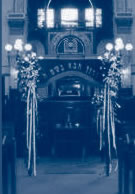|
SEDRA : Vayikra Shabbat Hachodesh : Hertz
Chumash p. 410 Leviticus Ch.1
This week's Sedra is generously sponsored by Noel Levin OAM.
SYNOPSIS:
The book of Vayikra - Leviticus introduces the sacrificial
system to be performed in the now completed sanctuary.
The Hebrew word "KORBAN" (sacrifice) is based on
the word "KAROV" meaning "near". Thus
a Korban is a means of drawing near to G-d by supplicating
for Divine forgiveness or expressing appreciation for Divine
assistance.
The sacrificial system was confined to the Sanctuary and later
the Temple. Following the destruction of the Temples (586
BCE and 70 CE) sacrifices were suspended. Prayers now serve
some of the purposes originally covered by sacrifices.
The five principal Sacrifices which could be offered by an
individual were:
*OLAH - literally "that which ascends". This was
an offering completely consumed by fire on the Altar and expressed
the intention of the person to >ascend= and completely
devote their life to the service of G-d.
* MINCHA - gift offering, usually consisting of flour and
often brought by people of modest means. It was usually brought
in the afternoon, hence our afternoon services are called
"Mincha". The meal-offering expressed the idea of
consecrating one's work to the service of G-d.
* SHLAMIM - Based on the word "SHALOM"; a peace
offering which also relates to the Todah or thanks offering.
It is called a `peace offering' since it established a closer
relationship with one's Maker. Only a small portion was burned,
some portions were given to the Cohanim, and the rest was
eaten by the offerer, his family and friends in a state of
joy and gratitude.
* CHATAT - a Sin offering to atone for unintentional transgressions
either by individuals, the High Priest, King or the Sanhedrin
(High Court). The offering varied according to rank and means.
* KORBAN OLEH V'YORED - a sin offering the nature of which
varied according to the means of the individual.
* ASHAM - Guilt offering as part of the penitence required
for perpetrating certain improper acts. These included improperly
using or appropriating, property of the Sanctuary unintentionally
- ME'ILAH. Another form of the sacrifice related to `false
dealings' with one's fellow man especially in cases of breach
of trust.
SPECIAL MAPHTIR - HACHODESH HERTZ CHUMASH P. 253 Exodus
Chap. 12
The Maphtir introduces the month of Nisan, month of redemption
and is a major source of the laws of Passover.
THE HAPHTORAH - HACHODESH HERTZ CHUMASH P. 1001 Ezekiel
Chap. 45 16
Ezekiel describes the Temple rebuilt in the "New Jerusalem"
and makes particular reference to the Passover sacrifices.
This continues the theme of the special Maphtir for Shabbat
Hachodesh.
TELL ME RABBI ..... THE MONTH OF NISSAN
"This month shall be for you the beginning of months;
it shall be the first month of the year for you" (Shemot
12:2)
The world was created in Nissan (Rosh Hashanna 11)
"This month shall be for you the beginning of months":
The Jewish people consider Nissan as the first month, and
all other months, the second, the third, etc., should be counted
according to it. Each time we count the months, we also remember
the miracle of the Exodus. This is why the months have no
name in the Torah for example "the third month",
"in the second year, in the second month, the cloud was
lifted" (Bamidbar 10:11); "and on the first day
of the seventh month" (Bamidbar 29:1), and so on with
all the months.
In a similar way we remember the Sabbath day, by counting
the days of the week in accordance to it. However, when reckoning
years, we do not count from Nissan but from Tishre. (Ramban,
Parshat Bo). The names "Tishre", "Nissan"
etc. originated during the time of the Persian/Babylonian
exile.
Nissan is the month of redemption. In this month our forefathers
were redeemed from Egypt, and in this same month the Jewish
people will eventually be redeemed again, hopefully soon in
our days. In this month our forefathers Abraham, Yitzchak
and Yaacov were born (according to Rabbi Yoshua's opinion),
and the Mishkan (Tabernacle) was set up (Shemot 40:2). Also,
the princes of each tribe brought their offerings for the
dedication of the mishkan. (Rosh Hashanna 11).
CUSTOMS FOR THE MONTH OF NISSAN
During the time of the Bet Hamikdash, our sages established
the rule to teach the people thirty days before any one of
the three festivals regarding its laws, so from Purim onwards,
we begin studying the laws of Pesach.
It is customary to omit those additional prayers which are
mournful or supplicatory since Nissan is the month of redemption.
This is also based on the fact that on the completion of the
Mishkan on the first of Nissan the princes of the tribes began
offering their korbanot (sacrifices) for the dedication of
the altar, one prince each day, until the 13th of Nissan.
Each prince made a celebration on the day of his offering.
On the eve of Pesach the whole of Israel rejoiced, as they
all brought the Pesach offering. After this follow the eight
days of Pesach. Except for the 13th of Nissan, which has no
special event, and the last few days of Nissan, most of the
month was spent in holiness. Thus the whole month is considered
a `Yom Tov' a period of Joy.
KIMCHA D'PISCHA - "flour for Pesach"
It was customary to buy wheat to distribute among the poor
before Pesach in order to enable them to have Matzot for the
Festival. This custom is particularly apt for our Festival
of Freedom when we recline and relax as a sign of prosperity.
It is an affront to G-d, if at such a time we ignore the plight
of those who are in need. Today various funds exist in Jewish
communities to enable families in need to buy supplies required
for Pesach and the Seder.
Congregants wishing to contribute locally should get in touch
with Rabbi.
BACK TO SHABBAT SHALOM
TABLE
|








